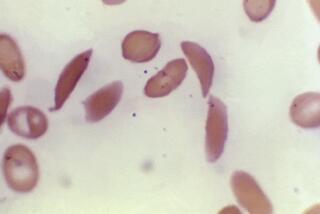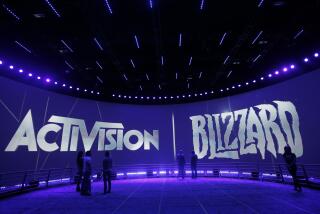British Court Rules Against Amgen
- Share via
An appeals court in Britain on Wednesday reversed Amgen Inc.’s victory in a patent infringement suit over its anti-anemia drug.
The decision by an appeals court in London means Amgen could face competition from Transkaryotic Therapies Inc. before the European patent on the drug expires in 2004.
At stake is a European market worth more than $800 million, with Britain representing 8% to 10%. Although the court decision affects only Britain, analysts said it could influence the outcome in other countries.
Amgen said it is considering an appeal to the House of Lords. However, Thomas J. Dietz, an analyst with Pacific Growth Equities in San Francisco, said the House of Lords rarely hears patent appeals.
The case involves Amgen’s patents on genetically engineered erythropoietin, a protein that spurs red blood cell production. Amgen sells the protein under the name Epogen in the U.S., where it accounts for $2 billion in annual sales.
Thousand Oaks-based Amgen doesn’t market the drug in Europe. Johnson & Johnson sells it there under the name Eprex through a licensing deal with Amgen. The drug is marketed to dialysis patients because their damaged kidneys do not produce enough erythropoietin.
The case is significant to Amgen in two ways: The company receives a licensing fee on sales by Johnson & Johnson; and last summer, Amgen launched a second-generation anti-anemia drug in Europe to reclaim revenue it had lost to Johnson & Johnson, the company’s estranged business partner. Called Aranesp, the drug had worldwide revenue of $56 million in the second quarter.
Analysts said Transkaryotic’s drug, called Dynepo, closely resembles Eprex and is a greater threat to the Johnson & Johnson drug than it is to Aranesp.
Moreover, Johnson & Johnson has had a rash of serious illnesses and one death linked to its drug in Europe, making it vulnerable to competition.
Dietz said profit on Dynepo is high so that Transkaryotic and its marketing partner, Aventis, could use price as a weapon against Eprex and, to a lesser extent, Aranesp. “This are 95% gross-margin products,” he said. “You don’t necessarily want to use price, but you can.”
Cambridge, Mass.-based Transkaryotic and Aventis this year received approval from the European Union to market Dynepo. But Transkaryotic Chief Executive Richard F. Seldon said that French drug maker Aventis does not want to launch the drug in Europe until there is a ruling in a similar patent infringement case in the U.S.
A federal district court in Boston last year ruled that Transkaryotic infringed three Amgen patents.
The U.S. Court of Appeals for the Federal Circuit heard arguments in the case in May, and Transkaryotic said a decision is not expected until early next year.
Elise Wang, an analyst with Salomon Smith Barney in New York, said the hurdles are higher for Transkaryotic in the U.S. patent case.
Amgen, as part of its lower-court victory, obtained an injunction that prevents Transkaryotic and Aventis from manufacturing Dynepo in the United States for export markets. That ruling could make it difficult for the companies to supply the European market, because its Dynepo manufacturing facilities are in the United States.
Transkaryotic spokeswoman Justine Koenigsberg said Aventis “is developing manufacturing options,” but she would not be more specific.
Amgen shares Wednesday closed up 15 cents at $45.64, while Transkaryotic shares fell 35 cents to $38.55, both on Nasdaq.
More to Read
Inside the business of entertainment
The Wide Shot brings you news, analysis and insights on everything from streaming wars to production — and what it all means for the future.
You may occasionally receive promotional content from the Los Angeles Times.










